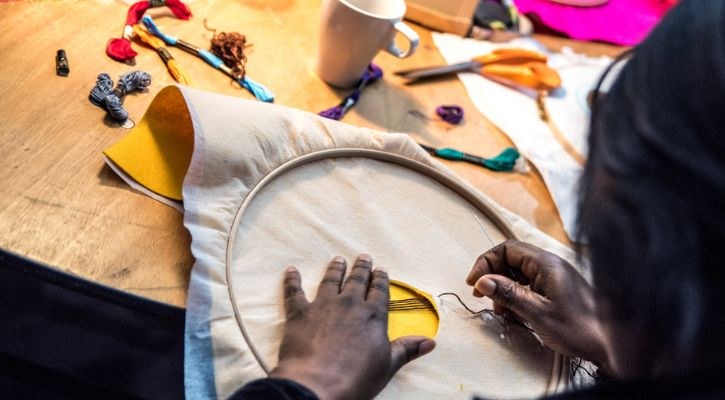Vision why we're here – Creative expression for all
Mission what we're doing to fulfill our vision – Empowering communities through arts
Values what matters to us in delivering our mission – Respond – Empower – Amplify
Ethos how we live our values - Joy – Freedom – Authenticity
Why Trinity has a Glossary
At Trinity, we recognise that language evolves, and words can hold different meanings for different people. To make sure we communicate clearly and consistently, we’ve created a glossary that explains how we use key terms across our work.
Our aim is transparency: when we say words like community, diversity or governance, we want everyone - our team, partners, funders and stakeholders - to understand exactly what we mean.
Here are some of the regular words Trinity uses to describe our work and activities and what they mean to us:
Vision why we're here and what we hope the world will look like if we succeed in our mission – Creative expression for all
Mission what we're doing to fulfill our vision – Empowering communities through arts
Values what matters to us in delivering our mission – Respond – Empower – Amplify
Ethos how we bring our values to life in our work - Joy – Freedom – Authenticity
Purpose The social and civic impact we aim to achieve through our work, including citizen-led advocacy, cultural influence and inclusion
Creativity is the process by which we or others make or present something; a work of art, a song or a show, for example
Culture is the result of that creative process and how we meet that in our everyday lives; that could be in museum, theatres or gallery, at a carnival or music venue, or even in our homes and online spaces
Associate is an Artist collective or grassroots group we work with and support in order to further our charity mission and values
Artist is anyone developing their professional or emerging career in the arts
Artist Rider the Principles, Criteria and Contract is how we communicate to Artists about the work we want to resource, how and why
Art is/are the things that are made, created and experienced (the outputs of our Creativity and Culture)
Combined-Arts (or Multidisciplinary-Arts) means all different types of art. Trinity's focus areas are: Music (genres that align with our Centre's heritage); Spoken Word; Performing Arts (Theatre & Dance)
Heritage is the shared stories we have about our past and who we are and the shared places and spaces that connect those stories
Programme is the things that we host or deliver; this could be an event, workshop, performance or digital/online art experience
Programming is the process by which we make choices about the Programme
Profit Refers to the financial sustainability of Trinity via our trading subsidiary incl earned income through diverse revenue streams that enable long-term delivery of our mission
Resilience The ability of a person, organisation and/or cultural asset to thrive long-term
Diversity valuing multiculturalism, protects and ensures communities can express their identities, traditions and experiences on equal terms
Inclusion actively ensuring all communities and individuals, particularly underrepresented voices, can access, participate in, and influence cultural programmes
Community The people who use, shape, and are served by our spaces, programmes, and cultural initiatives or a group of people connected by their locality, shared need and/or interest
Our People is anyone who we work for/with incl artists, audiences, participants, communities and target groups such as children and young people - with a focus on participation, wellbeing, learning, and empowerment
People/Citizen-led means participatory, taking part, made by and with; can also be Citizen-led
Citizen means a person who lives and/or work in a town or city
Citizens' Assembly A participatory forum of community members who inform and guide decision-making on cultural policy, programming, and civic priorities
Civic is a value that relates to a particular place or community
Asset of Community Value (ACV) Physical spaces and heritage buildings (e.g., Trinity Centre, Jacobs Wells Baths) held for public benefit, cultural activity, and community use
Community Asset Transfer (CAT) The process of placing an ACV in the long-term guardianship of a charity like Trinity to protect its future civic-cultural use
Our Communities are those who use/live around our Centre; this could be a community of interest, target group or neighbourhood (usually within a 1m radius of our Centre)
Neighbourhood when we say 'our neighbourhood' this usually means the immdiate locality around the Trinity Centre - between a 1m (e.g. St Judes, Newtown, Stapleton Road, Old Market) to 3m (Easton, Lawrence Hill, Redfield, St Paul's)
Participatory things that are made with ordinary people who may not consider themselves as artists taking part
Project a distinct, time specific, finite activity, possibly funded by a grant or sponsor
Outputs the things delivered or created that can be experienced or measured
Outcomes what People get out of taking part/experiencing the Outputs and how we know it matters to them
Governance The structures, policies, and processes that ensure accountability, transparency, risk management and sustainable stewardship of our people, assets, and resources
Data Democracy Using accessible digital tools and platforms to gather, share, and act on information, empowering communities and informing decision-making
If you'd like us to explain what we mean by what we say or if any wording in this glossary feels unclear, uncomfortable, or inaccurate, we welcome feedback - please get in touch so we can update it and ensure our language reflects the communities we serve.





